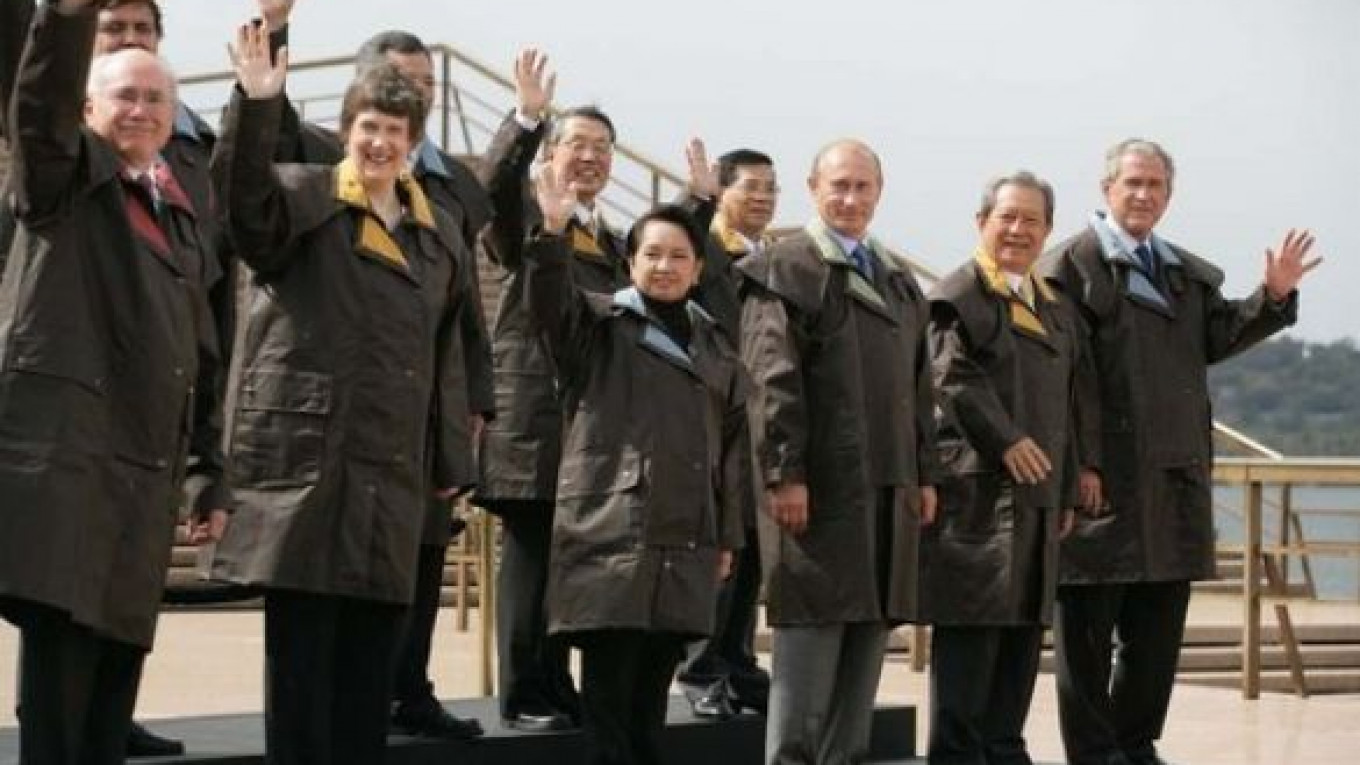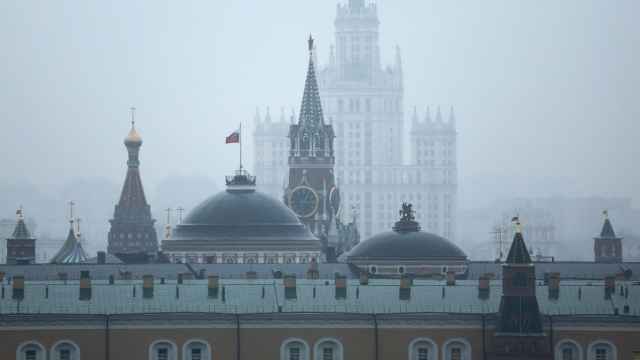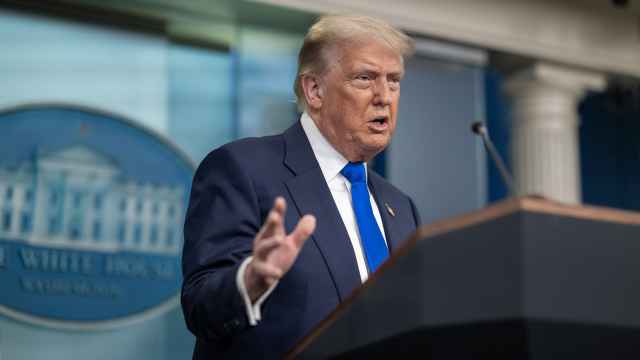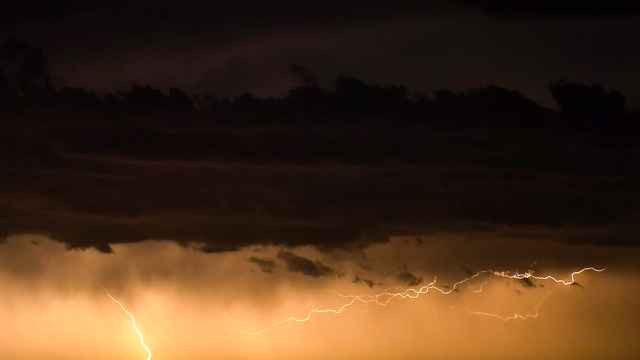VLADIVOSTOK — Top government figures and delegates at an Asia-Pacific forum in this formerly backwater naval outpost found "Spartan but commendable" conditions at an island venue here that wasn't their usual five-star hotels, President Vladimir Putin said Sunday.
In addition to the formal agenda, the Asia-Pacific Economic Cooperation forum, which wrapped up Sunday, presented a chance for Russia to stake a claim to a greater role in Asia. The country put a lot of effort into showing that it cares for its vast, scarcely populated and underdeveloped East — and Putin said the attendees took note.
The forum of 21 economies, including the United States, China and Indonesia, took place on a scenic island just off Vladivostok, at the campus of a just-completed state university, with green parks, seafront alleys and a view of a giant bridge that the government ordered be built in time for the meeting. Many of the guests lived at the campus premises, in buildings that will later house student dormitories.
"Our guests appreciated the idea of not conducting the meetings in five-star hotels," Putin said at the closing news conference. "They were happy that they were the first to walk on this territory and these premises. The conditions were somewhat Spartan, but absolutely commendable."
Room prices, however, were about as merciless as at five-star hotels. Including three meals and non-alcoholic beverages, they ranged from 14,400 rubles for a single to 29,400 rubles for a presidential suite, according to President-Servis, the company that ran the accommodations during the event.
Some of the deals and ceremonies on the sidelines of the forum, which Russia is hosting for the first time, may have reinforced the idea that the government is really into shaping a brighter future for the region.
Gazprom chief Alexei Miller and Ichiro Takahara, director-general of Japan's Agency for Natural Resources and Energy, on Saturday signed a tentative agreement to cooperate in financing the planned construction of a liquefied natural gas, or LNG, plant near Vladivostok. The agreement, signed as Putin and Japan's Prime Minister Yoshihiko Noda looked on, also calls for Japan's assistance in marketing the gas. With the construction costs estimated at $7 billion, the facility will likely have an initial capacity of 10 million metric tons, and it could expand.
"This project could grow into a very large one by international standards," Putin said at the news conference.
When it starts operating, perhaps in 2016 or 2017, it could ship most of its fuel to Japan, which needs increasing supplies to power its electricity stations after last year's nuclear-reactor disaster triggered shutdowns of similar plants across the country.
The stoves that cooks used to prepare meals for the guests operated on natural gas that came all the way from offshore Sakhalin, an island to the north, in a pipeline that Gazprom completed as part of preparations for the forum. The same pipeline would feed the plant.
Putin also attended the cornerstone-laying ceremony for Rosneft's petrochemical plant outside of Vladivostok. Earlier last week, he opened a $300 million joint venture between Russian carmaker Sollers and Japan's Mazda to assemble Japanese cars in Vladivostok.
During a forum speech and at the news conference, Putin also pointed to some other cash-intensive projects that the government aims to carry out in the region, such as the Vostochny launch pad. Russia and China are hoping to develop a wide-body jet to compete with Boeings and Airbuses, and they could place some production of the future aircraft in Russia's Far East, he said.
According to the U.S. State Department, the last time Russia articulated its desire to raise its profile in the Asia-Pacific region happened under Soviet President Mikhail Gorbachev in 1986. Gorbachev then gave a "famous speech in Vladivostok about Russia wanting to play a more purposeful role," a senior State Department official said in a special briefing for U.S. reporters Friday, a transcript of which is available on the agency's site. "In fact, they have not played a very active role to date."
KUDOS, JABS
In a compliment to APEC, Putin said the future lied with regional, rather than global, integration. In this regard, he also mentioned Russia's latest effort to create a trade bloc: the customs union with Belarus and Kazakhstan.
Putin also took a jab at the WTO, saying it was unheard of for the WTO to move as quickly on an issue as the Asia-Pacific forum did in agreeing on a list of 50-odd green technologies that the countries want to have more accessible by slashing import duties on them by 2015. It took the forum members only several months to come up with a decision after declaring the plan at the last meeting in Honolulu.
On another WTO-related topic, Putin said Russia would push for changes in the organization's rules to allow member countries to protect their vulnerable industries at times of global instability.
"As a full-fledged member of this organization, we intend to get rigorously involved in the process of shaping fair rules of international trade," he said in a keynote speech to APEC chief executives Friday.
Putin also proposed that Asian economies consider the Russia-led customs union as a transportation bridge to Europe.
"If you look at the territory of the three countries, it will be clear that we do have something to offer," he said.
The customs union is sandwiched between China and the EU.
U.S. Secretary of State Hillary Clinton, who stood in for President Barack Obama at the forum, called for the removal of protectionism and other measures in order to promote free trade.
A U.S. business executive said he was skeptical that the governments would raze their trade barriers any time soon.
"Leaders echo the same message that we need an open market," he said on condition of anonymity because he wasn't authorized to speak to the press, adding that governments do introduce new trade hurdles anyway. "Maybe we need more action and less talking."
BEAUTIFUL SCENERY
Some of the forum's delegates were put up onboard the Legend of the Seas, a huge white cruise ship anchored in the harbor for the occasion. A free bus trip from the ship to the forum's venue took about an hour, taking participants from the heart of the city — close to its sea terminal and tsarist-era railway station at the end of the Trans-Siberian Railroad — across the high suspended bridges and along the sea coast.
"It's a long bus ride, but when you have scenery like that it's beautiful," said Alexandra Ho, a project manager at the Asia Pacific Foundation of Canada think tank, on one such ride.
Many Soviet-era apartment buildings along the route wrapped themselves in fresh canary-colored paint.
Ho was appreciative of Russia's effort to use the APEC forum to win a greater role in Asian trade.
"A lot of countries, especially non-Asian ones, want to increase their presence in Asia," Ho said. "The key part of this is infrastructure — and that is what Russia has done here. It shows its shift toward Asia."
Besides the bridge to the forum's venue, Russky Island, the government bankrolled a shorter bridge to connect two city districts and ease traffic congestion. A new airport terminal, funded by state-controlled Sheremetyevo Airport, and a recently completed road from the facility are also part of the construction effort for the APEC forum.
The government and state-controlled companies ploughed about $20 billion into various construction projects over the last five years to make Vladivostok worthy of hosting the international summit.
But the seamy side of Vladivostok was sometimes just a stone's throw from the parade of spotless motorways and fresh paint. One of the free buses, in an apparent bid to cut corners, steered off the track and took the riders through a rough patch of bumps on a road that apparently suffered damage from the region's frequent rainfalls, known to crack and wash away chunks of asphalt.
Putin said at the news conference that work would go on to improve living conditions in the city.
"What has been done is just the first steps," he said. "We practically operated on a site for construction that hasn't ended. And it's OK, given the magnitude of the construction."
Related articles:
A Message from The Moscow Times:
Dear readers,
We are facing unprecedented challenges. Russia's Prosecutor General's Office has designated The Moscow Times as an "undesirable" organization, criminalizing our work and putting our staff at risk of prosecution. This follows our earlier unjust labeling as a "foreign agent."
These actions are direct attempts to silence independent journalism in Russia. The authorities claim our work "discredits the decisions of the Russian leadership." We see things differently: we strive to provide accurate, unbiased reporting on Russia.
We, the journalists of The Moscow Times, refuse to be silenced. But to continue our work, we need your help.
Your support, no matter how small, makes a world of difference. If you can, please support us monthly starting from just $2. It's quick to set up, and every contribution makes a significant impact.
By supporting The Moscow Times, you're defending open, independent journalism in the face of repression. Thank you for standing with us.
Remind me later.






